|
|
|
Sort Order |
|
|
|
Items / Page
|
|
|
|
|
|
|
| Srl | Item |
| 1 |
ID:
106720
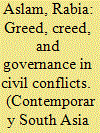

|
|
|
|
|
| Publication |
2011.
|
| Summary/Abstract |
The Baloch nationalists have been actively involved in an armed struggle against the government of Pakistan during the last decade. Indeed, the recent risk assessment report produced by the Minorities at Risk Project places the Baloch population at a high risk for future rebellion. A detailed analysis of the ongoing conflict reveals that in addition to the classic greed- and grievance-based explanations, poor governance resulting from the ongoing plunder of Balochistan's natural resources and its economic and political marginalization has been a major cause of mounting tension between the Baloch people and the government of Pakistan. The presence of insurgent groups and the continuation of violent conflict in neighboring Afghanistan might lead to further instability in Balochistan. The government of Pakistan therefore seriously needs to reform its strategy and address the issues that have lead to the escalation of the conflict under discussion during the last decade.
|
|
|
|
|
|
|
|
|
|
|
|
|
|
|
|
| 2 |
ID:
185186
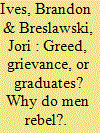

|
|
|
|
|
| Summary/Abstract |
Education is widely known for its positive effect on conventional politics and nonviolent protest as well as its suppressive effect on violence. However, recent studies have connected education to violence through its effect on relative deprivation and frustration–aggression mechanisms. We address these divergent findings by presenting a theory of the conditional effect that education has on violence. To do so, we build on literature addressing education’s positive association with political participation, such as voting and protests, and question how this relationship translates to contexts in which conventional and nonviolent channels are unlikely to be effective – specifically, in cases of politically excluded ethnic groups. We argue that education increases ethnic group members’ resources and desire to address grievances. Yet, because the ethnic group is politically excluded, opportunities for conventional politics and nonviolent protest are limited. Educated ethnic group members are limited in political options, and are thus more likely to address their grievances through the support of rebel groups, increasing the probability of violence. Violence then occurs in localities where members of a politically excluded ethnic group are located and where those members have higher levels of education. Using geo-spatial data and statistical analysis, we demonstrate that education has divergent effects on violence in areas populated by politically excluded versus politically included ethnic groups in Africa and Central America. Areas with highly educated politically excluded ethnic group members are the most likely to experience violent events.
|
|
|
|
|
|
|
|
|
|
|
|
|
|
|
|
| 3 |
ID:
120123
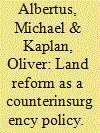

|
|
|
|
|
| Publication |
2013.
|
| Summary/Abstract |
Can targeted land reform reduce levels of civil war conflict by mitigating the factors that contribute to rural rebellion? This article uses new micro-level data on land reform and insurgency at the municipal level from Colombia from 1988 to 2000, a country with high rates of land inequality and informal land ownership, to test whether land reform undercut subsequent guerrilla activity. The reform had two distinct aspects. Politically powerful large landholders blocked most large-scale reform, which resulted primarily in an enduring, low-intensity, and geographically dispersed reform that spurred low levels of insurgent activity. Larger-scale reforms were only implemented in areas that threatened serious violence and had the potential to harm elite interests, and in these limited areas reform reduced guerrilla activity. This suggests that while land reform can be an effective counterinsurgency policy, it may be politically difficult to implement at a sufficient scale because it threatens the status quo.
|
|
|
|
|
|
|
|
|
|
|
|
|
|
|
|
| 4 |
ID:
188712


|
|
|
|
|
| Summary/Abstract |
Grievance and opportunity theories dominate research on the causes of civil war. However, theoretical and empirical problems limit their ability to explain variation in conflict onset. We argue that these problems partly stem from treating them as largely independent explanations. We integrate grievance and opportunity into a unified theory and argue that they are complements that jointly predict conflict. We apply insights from the interstate war literature to develop and test a theory of conflict onset that argues that the probability of civil war increases as the disparity between relative power and the status quo distribution of benefits increases.
|
|
|
|
|
|
|
|
|
|
|
|
|
|
|
|
| 5 |
ID:
106029
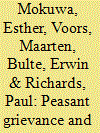

|
|
|
|
|
| Publication |
2011.
|
| Summary/Abstract |
Was the civil war in Sierra Leone (1991-2002) fought for diamonds, or was it a peasant insurgency motivated by agrarian grievances? The evidence on both sides is less than conclusive. This article scrutinizes the peasant insurgency argument via a more rigorous methodology. Hypotheses concerning intra-peasant tensions over marriage and farm labour are derived from an examination of the anthropological literature. These are tested using econometric tools, applied to data from a randomized survey of 2,239 households in 178 villages surrounding the Gola Forest in eastern and southern Sierra Leone, the cradle of the war. It is shown that a decade after the war ended peasant disputes over marriage continue to mark out an incipient class divide in isolated rural communities, as evidenced by cases presented in local courts and family moots. Disputes mainly involve a village elder suing a young man with weak social protection. Fines are exceptionally high, and mostly paid off in the form of coerced farm labour. It is argued that grievance over this long-standing form of labour exploitation fed insurgency, and contributed to the otherwise puzzlingly high levels of peasant-upon-peasant violence associated with the war in Sierra Leone.
|
|
|
|
|
|
|
|
|
|
|
|
|
|
|
|
| 6 |
ID:
131514
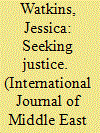

|
|
|
|
|
| Publication |
2014.
|
| Summary/Abstract |
In Jordan, tribal dispute settlements have played a Pivotal Role in the management of various types of grievances between individuals since long before the establishment of the modern state. To varying degrees, Jordanians-from the East and West Banks, Muslim and Christian, urban and rural-cherish the kinship networks associated with these procedures, and the ?a?wa (truce) and ?ul? (reconciliation) processes remain time-honored mechanisms for preventing revenge and making amends for wrongs committed. However, under the state's influence, the purpose of observing tribal settlements is evolving within an increasingly heterogeneous society. Drawing on documentary analysis combined with ethnographic material from across the kingdom, this article investigates the current status of tribal dispute resolution traditions among different sectors of the population. I argue that observance of such traditions can signify conformity with the hegemonic values that the state promotes as well as resistance to aspects of state control.
|
|
|
|
|
|
|
|
|
|
|
|
|
|
|
|
| 7 |
ID:
132820
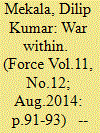

|
|
|
|
|
| Publication |
2014.
|
| Summary/Abstract |
If asked, ministry of home affairs (MHA) downplays this, but India's internal security battle is being fought by the most disgruntled, demotivated paramilitary troops. The reason for such a shameful situation is the inaction by the ministry in resolving the grievances of the forces. FORCE has interacted with many officers below Commandant rank deployed in operational positions, who claim that the weak leadership is to be blamed entirely for the situation.
MHA has often painted a rosy picture that all is well within the forces. Even in the Parliament recently, while explaining the reason behind huge number of Central Reserve Police Force (CRPF) officers quitting their jobs, the ministry stated that it is "normal and acceptable". From 2009 to 2012, in the CRPF alone 16,523 officers quit their jobs. What is more baffling is the casual tone of reasoning that the ministry has provided in justifying this issue. "The causative factors in most of the cases were mainly found to be various personal and domestic reasons… Some personnel seek voluntary retirement to enjoy a static life as well as pensionary benefits after completion of 20 years of regular service," said minister of state (home), Kiran Rijiju.
What MHA conveniently did not state in the reply to the Parliament is that most of the officers who quit their jobs were troubled by their uncertain career progression - they believed that no due credit was given for risking their lives in conflict zones. Poor salary also caused a lot of dissatisfaction. Presently, there are at least 10,000 officers from all paramilitary forces fighting various legal cases in the courts, thus proving that all's not well within.
|
|
|
|
|
|
|
|
|
|
|
|
|
|
|
|
| 8 |
ID:
154843
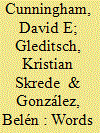

|
|
|
|
|
| Summary/Abstract |
Dissidents can choose among different tactics to redress political grievances, yet violent and nonviolent mobilization tend to be studied in isolation. We examine why some countries see the emergence of organized dissident activity over governmental claims, and why in some cases these organizational claims result in civil wars or nonviolent campaigns, while others see no large-scale collective action. We develop a two-stage theoretical framework examining the organized articulation of political grievance and then large-scale violent and nonviolent collective action. We test implications of this framework using new data on governmental incompatibilities in a random sample of 101 states from 1960 to 2012. We show that factors such as demography, economic development, and civil society have differential effects on these different stages and outcomes of mobilization. We demonstrate that the common finding that anocracies are more prone to civil war primarily stems from such regimes being more prone to see maximalist political demands that could lead to violent mobilization, depending on other factors conducive to creating focused military capacity. We find that non-democracy generally promotes nonviolent campaigns as anocracies and autocracies are both more likely to experience claims and more prone to nonviolent campaigns, conditional on claims.
|
|
|
|
|
|
|
|
|
|
|
|
|
|
|
|
|
|
|
|
|